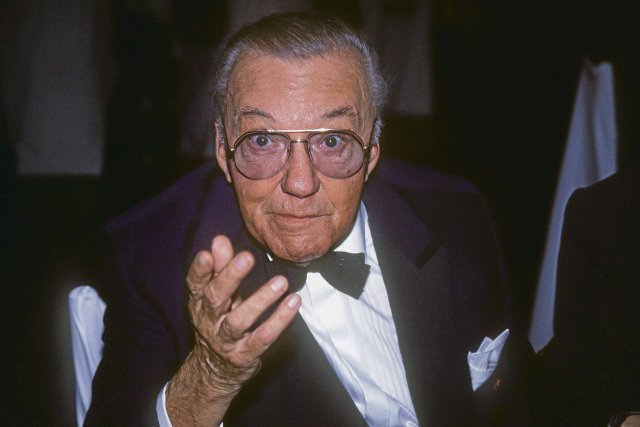“He is the way the Germans are”: Heinz Schenk
Photo: imago/Sven Simon
It’s quite possible that many people today wouldn’t know what a “Bembel” is if the legendary West German entertainment program “Der blau Bock” hadn’t existed. A total of 208 episodes were “broadcast” between 1957 and 1987, as they used to say in the days of analog television. The triumph of the “Bembel”, the traditional Hessian cider jug, as a cult object may have had a direct connection to the enormous popularity of the TV show, which was presented by the entertainers Heinz Schenk and Lia Wöhr from 1966 onwards, in color from 1967 onwards.
“Der Blaue Bock” was a unique cultural industry product: a program in which German humor, German hits and German marching and folk music were merged into a compact unit. It was the guarantee that everything remained the same ideologically and atmospherically in post-National Socialist West German society. The difference was that now there was no longer marching, but rather swaying.
With his TV show, Heinz Schenk “filled the big gap of expelled national pride with escapism, heartbreak and nostalgia after the Second World War,” says Hessischer Rundfunk on the occasion of a new documentary about Heinz Schenk’s life (“The 20 Million -Man”). The city magazine “Journal Frankfurt” puts it almost word for word: “After the Second World War, Schenk filled a gap in the post-National Socialist era with positively connoted traditions such as the sociable cider culture or carnival.” Schenk had a “rather conservative manner,” his Show was “traditional.” What this probably means is that the cheerful clapping to the marching rhythm of folk songs helped many spectators suppress the crimes of the Nazi era. Instead of the Horst Wessel song or “Germany, Germany, about everything,” people now sang loudly “A cheers to cosiness” or “We won’t let ourselves be forbidden from singing.”
Meanwhile, the wind of modernization might be blowing on the streets of the big cities, and the 1968 revolt also left clear traces (miniskirts, hashish, Willy Brandt, RAF). The growing youth wanted “everything but no more German songs,” as it says at one point in the documentary.
A year before Schenk took over as host of the “Blauer Bock”, the rock and pop show “Beat-Club” appeared on German television for the first time. So everyone had their own television show: the forced democratized old people and the rebellious young people. And just as some of the younger generation grew their hair, indulged in Anglo-American pop music and protested against their parents’ lies, the older German citizen wanted to give in to blissful oblivion and not give up his right to a piece of an ideal world. And that’s what he got reliably every Saturday on the first program: 90 minutes of regular table jokes, bad music and “happiness”, fueled by alcohol consumption (“Äbbelwoi”) and thigh tapping – the whole inferno presented against the backdrop of a Hessian apple wine tavern had set up on the stage of some small town hall.
The “Blue Bock” – the name of the show itself is an allusion to the fact that, when viewed, the copious consumption of alcohol is helpful in generating pleasure – served the audience primarily to “insulate themselves from all the demands of the real world outside.” , this is how the filmmakers analyze. The Germans loved the show. 20 million people regularly sat in front of their screens when it was on. It was the ideal TV entertainment. The reactionary Springer paper “Die Welt” counts the folk music show as part of the “golden era of German television.”
No matter how much the pubescent son or adult daughter protested in the living room because the good John Ford Western was playing on ZDF at the same time, it didn’t switch. It was important to watch Heinz Schenk distribute “Bembeln” and tormentedly listen to the medium trio singing: “A hole is in the bucket, Karl-Otto, Karl-Otto/ A hole is in the bucket, Karl-Otto, A hole/ Plug it up, oh Henry, oh Henry, oh Henry/ Plug it up, oh Henry, shut it up.”
»The 20 Million Man«, which can currently be seen in the ARD media library, now for the first time sheds light on the career and private life of the actor, singer and showmaster Heinz Schenk, who was so popular during his lifetime, who »with Bernhard Grzimek and Hans- Joachim Kulenkampff was one of Hessischer Rundfunk’s greatest entertainment hosts” (“Frankfurter Rundschau”) and in 2014 at the age of 89 died years ago, five months after the death of his wife Gerti. The TV documentary explains the success of the “Blue Bock,” which he moderated for decades, albeit in idiosyncratic language and completely omitting the Holocaust, with the special needs of the German population in the post-war period: “A whole generation wants to forget the war and thirst for unencumbered traditions.«
The film by Henriette von Hellborn and Sven Waskönig wants to tell the “story of Germany’s greatest petty bourgeois,” who began his career as a carnival joke teller: his childhood and youth under National Socialism; the priest who manipulated the “ancestral passport” of young Heinz Schenk, who had a Jewish grandmother; the time during the last two years of the war as a radio operator in the Wehrmacht; the successful career as a popular television entertainer; his 60-year marriage to his wife Gerti; and the sad story of his estate, most of which was sold at auction.
The documentary also shows historically interesting archive material from the “Blauer Bock”, such as a performance by the Golden Gate Quartet, made up of four black US gospel singers, who perform “Schwarzbraun ist die Hazelnut” (a scene that is rather clumsily commented on: “Today “It seems strangely out of place”), but also images from the partially shielded private life of the childless couple Heinz and Gerti Schenk.
The film provides a look into the couple’s bungalow in Wiesbaden. The camera shows us brown living room armchairs from the 80s, brown ceiling beams, beige sofas and curtains, dark carpets, dark wooden cupboards, “Bembel” on shelves, knick-knacks and pewter plates on the walls, as well as paintings depicting village idylls from the 19th century. Gelsenkirchen Baroque in its extreme version. The nd author, publisher and pop culture expert Jonas Engelmann, one of those interviewed by the filmmakers, describes his experience of entering the Schenk couple’s living room as follows: »You came in and had the feeling that you were suddenly in your grandparents’ living room in 1982. «
David Gern, an editor at Hessischer Rundfunk, probably gave the most accurate description of the TV entertainer, who was given the nickname “Äbbelwoi-Babbler”: “He is the way the Germans are.” It was 100 years ago this Wednesday Heinz Schenk was born.
“The 20 Million Man – Entertainer Heinz Schenk”, 60 min., ARD media library
We-don’t-give-each-other anything

Our Christmas campaign not only brings the joy of reading, but also warmth and festivity into the house. With a three-month trial subscription you get a pair of left socks from Socks with attitude and a bottle of sparkling wine Social Sector – perfect for a relaxed winter time. A gift that informs, warms and supports the dropout program EXIT Germany supports. Order a We Don’t Give Each Other Gift now.
sbobet sbobet judi bola online judi bola online
